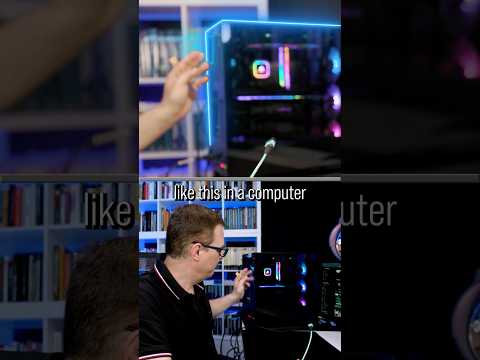
The Evolution of Speed in Computers
Computers have come a long way since their inception, especially in terms of speed. The concept of speed in computers refers to how quickly they can process data and perform tasks. Over the years, advancements in technology have led to significant improvements in computer speed.
One of the key factors that have contributed to the increase in computer speed is the development of faster processors. Processors are the “brains” of a computer, responsible for executing instructions and performing calculations. With each new generation of processors, manufacturers have been able to increase clock speeds and improve efficiency, resulting in faster overall performance.
Another important aspect of speed in computers is memory. Faster memory modules, such as RAM (Random Access Memory), allow computers to access and store data more quickly, leading to improved performance and responsiveness.
Advancements in storage technology have also played a significant role in enhancing computer speed. The transition from traditional hard disk drives (HDDs) to solid-state drives (SSDs) has significantly reduced loading times and improved overall system responsiveness.
Furthermore, improvements in software optimization have helped maximize the speed potential of modern computers. Developers are constantly working on optimizing code and algorithms to make programs run more efficiently and take full advantage of the available hardware resources.
Looking ahead, the future of speed in computers seems promising. Technologies such as quantum computing hold the potential to revolutionize computing speeds by leveraging quantum mechanics principles for ultra-fast processing capabilities.
In conclusion, the evolution of speed in computers has been a remarkable journey marked by continuous innovation and technological advancements. As we continue to push the boundaries of what is possible, it is exciting to imagine what the future holds for computer speed and performance.
6 Essential Tips to Boost Your Computer’s Speed and Performance
- Regularly clean up temporary files and unnecessary programs.
- Increase RAM for improved multitasking capabilities.
- Install a solid-state drive (SSD) for faster boot times and data access.
- Keep your operating system and software up to date for optimal performance.
- Use a reputable antivirus program to prevent malware slowing down your computer.
- Consider upgrading your CPU or graphics card for better processing power.
Regularly clean up temporary files and unnecessary programs.
Regularly cleaning up temporary files and removing unnecessary programs is a simple yet effective tip to boost the speed of your computer. Temporary files can accumulate over time and take up valuable storage space, slowing down your system’s performance. By regularly clearing out these files and uninstalling programs that you no longer use, you can free up resources and improve the overall speed and responsiveness of your computer. This maintenance task is easy to overlook but can make a significant difference in optimizing your computer’s performance for smoother operation.
Increase RAM for improved multitasking capabilities.
Increasing RAM is a simple yet effective way to enhance the multitasking capabilities of a computer. With more RAM available, the system can handle multiple tasks simultaneously without slowing down or experiencing performance bottlenecks. By upgrading the RAM, users can enjoy smoother and more efficient multitasking experiences, whether it’s running multiple applications, browsing the web with numerous tabs open, or editing large files. Investing in additional RAM is a practical solution to boost overall system speed and responsiveness for improved productivity and user experience.
Install a solid-state drive (SSD) for faster boot times and data access.
To enhance the speed of your computer, consider installing a solid-state drive (SSD). SSDs offer faster boot times and data access compared to traditional hard disk drives (HDDs). By upgrading to an SSD, you can significantly reduce loading times, improve system responsiveness, and enjoy a smoother overall computing experience. The speed benefits of an SSD make it a valuable investment for those looking to boost the performance of their computer.
Keep your operating system and software up to date for optimal performance.
Keeping your operating system and software up to date is essential for ensuring optimal performance on your computer. Updates often include bug fixes, security patches, and performance enhancements that can help your system run more smoothly and efficiently. By staying current with the latest updates, you can take advantage of improvements that can boost speed, enhance stability, and protect your computer from potential vulnerabilities. Regularly checking for updates and installing them promptly is a simple yet effective way to maintain the speed and overall performance of your computer.
Use a reputable antivirus program to prevent malware slowing down your computer.
Using a reputable antivirus program is crucial in maintaining the speed and performance of your computer. Malware can significantly slow down your system by consuming resources, running background processes, and causing system instability. By installing a reliable antivirus program, you can protect your computer from malicious software and prevent potential slowdowns caused by malware infections. Regularly updating your antivirus software and performing system scans can help ensure that your computer remains secure and operates at optimal speed.
Consider upgrading your CPU or graphics card for better processing power.
When looking to enhance the speed and performance of your computer, one effective tip is to consider upgrading your CPU or graphics card. The CPU (Central Processing Unit) is the core component responsible for executing instructions and calculations, while the graphics card handles visual processing tasks. By upgrading to a more powerful CPU or graphics card, you can significantly boost your computer’s processing power, allowing for faster and smoother performance when running demanding applications or games. Upgrading these components can help you take full advantage of the latest technologies and ensure that your computer operates at its optimal speed.
